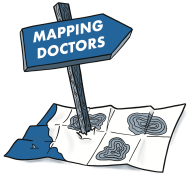Question: Why are you focusing your research on doctors’ training when there are shortages of staff across lots of different NHS professions including nursing?
Answer: We very much agree that all nursing, allied health and auxiliary staff are vital to the NHS, alongside doctors. However, we can’t look at everything in one research project. We chose to focus on doctors for two main reasons. First, because doctors have a very different training programme to other professionals in the NHS, which is organised geographically, and there is already some evidence that this affects which areas struggle to recruit. Second, because we work in a medical school, this means that we know about the training of doctors, and our experiences have given us ideas about what might be done differently and where things might change, which we want to research more fully.
Question: Who can take part? Do I have to be a UK medical graduate?
Answer: If you have a minimum of two years experience of studying or working in the NHS (undergraduate or postgraduate) then you are eligible to participate. In some areas of the UK, the majority of the workforce are international medical graduates, and so we will invite all those who currently work in the organisations we are recruiting from to participate, rather than restricting our focus to UK graduates. We are not in a position, at this stage, to influence international training pathways, but we hope that our findings will translate into useful findings that keep UK medical graduates in training, and supports them working in areas that struggle to recruit doctors, as well as providing important reflection on the role of international medical graduates in the NHS.
Question: Why are you looking at secondary care as well as primary care?
Answer: The ‘inverse care law’, where the areas which have the lowest number of doctors are the areas that need them the most because of the healthcare needs of the population, is well established in primary care. We are interested in the number of GPs, but also in which hospital locations and specialties struggle to recruit. Although this may be less visible to patients in continuity of care and access, we know it also costs the NHS a lot of money in recruitment and that there are some vacancies that hospitals struggle to fill.
Got a question about our research? Email mapping.doctors@lancaster.ac.uk and we will try to answer it.
